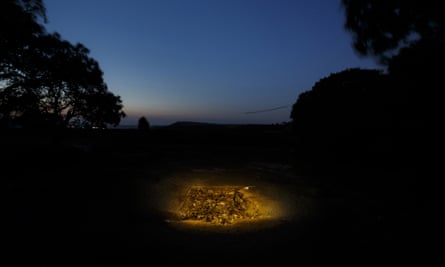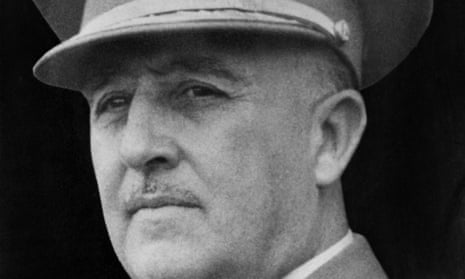The city of Pamplona will ask a local court to investigate crimes committed against its residents during the civil war and dictatorship of Francisco Franco after city councillors voted in favour of an unprecedented resolution.
“This is of huge importance,” said Carlos Slepoy, a human rights lawyer who, along with several organisations, helped draft the resolution outlining the course of action. “It will be the first time that a public institution in Spain – a city council that represents thousands of Spaniards – decides to present a criminal complaint in front of the Spanish courts.”
Pamplona, led by EH Bildu, a leftwing pro-independence coalition in the Basque country, is expected to file the criminal case in a local court in the coming months. It will then be up to the court to decide whether to launch an investigation.
The northern Spanish city was not on the frontline of the war, but authorities believe more than 300 residents were murdered during Franco’s regime. The resolution, passed on Friday, said: “The repression was completely gratuitous, bloody, massive and brutal. Elected authorities were persecuted and detained, social organisations were suppressed and their members detained and jailed.”
Slepoy described the resolution as the start of a movement capable of chipping away at Spain’s official reluctance to delve into the past. “We’re confident that this will spark many other similar initiatives in city councils or among individuals,” he said.
Four decades after Franco’s death, the country has never officially investigated the crimes committed during his regime. The rebellion he led against the elected government led to the civil war and paved the way for 36 years of unopposed rule.
In recent years, those representing victims have become increasingly vocal, calling on authorities to do more to look into the regime’s dark history and investigate the stories of the estimated 114,000 people who disappeared during the civil war and ensuing dictatorship.
Their calls have been met with resistance from those who worry about opening old wounds and others who point to the legal implications of violating the 1977 amnesty law that shields Franco-era crimes from trial.
The Spanish judge Baltasar Garzón was one of the few to challenge the amnesty law and investigated the crimes of the regime in 2008. His judicial career came to an end in 2012 when he was convicted of illegally ordering wiretapping in a corruption case involving the People’s party.
Slepoy said the amnesty law would not be an obstacle for the resolution in Pamplona. “This law is absolutely illegitimate in that it shields crimes against humanity,” he said, pointing to international criticism by organisations such as the United Nations.
Far from exacerbating divisions in society, he argued that investigating the past would strengthen Spain by allowing for a new, more democratic memory of contemporary history. “The memory that Spain has right now is that which was left behind by Franco,” Slepoy said.

Pamplona’s decision came after the campaigner Ascensión Mendieta, 90, was given the go-ahead to exhume the body of her father, who was executed by Franco’s forces.
Mendieta was 13 in 1939 when her father, a local union leader, was shot dead by fascist troops.
Two years ago, Mendieta boarded a plane for Buenos Aires, where a judge invoked the principle of universal justice to address Franco-era crimes. “I just want to take at least one of my father’s bones to my grave. Then I’ll die peacefully,” she told reporters, holding up a picture of her father as she readied herself for the 6,000-mile journey.
The Argentinian court sided with her, ordering Spain to excavate the patch of land in the Spanish province of Guadalajara, where Mendieta believes the remains of her father lie, and to carry out a DNA test.
When it reached Spain, the request was initially denied by a judge, who argued there was confusion on where exactly her father’s body might be.
But this week, a second judge backed the decision from the court in Argentina, ruling that the unmarked grave be opened and her father’s remains exhumed. “I cried when I received the news, I was so happy,” Mendieta told the Spanish television show El Intermedio on Wednesday.
Hours later, as the sun rose in Tenerife, historical memory campaigners scored another victory, as local authorities took a jackhammer to a Franco monument in the mountains of Las Raíces.
The imposing column marked the meeting spot where, in 1936, Franco hashed out the details of his uprising against the elected government. On Thursday, the monument was demolished, in compliance with a 2007 law requiring the removal of Francoist monuments and symbols from public places.
Tenerife politician José Antonio Valbuena noted that material from the monument would be reused to pave the ditches alongside the same roads where many on the island continue to search for family members who went missing during the Franco era.
“It’s one of those paradoxes of life,” he told the broadcaster Cadena Ser. “Part of the debris of the Franco monument will now end up in a ditch.”










